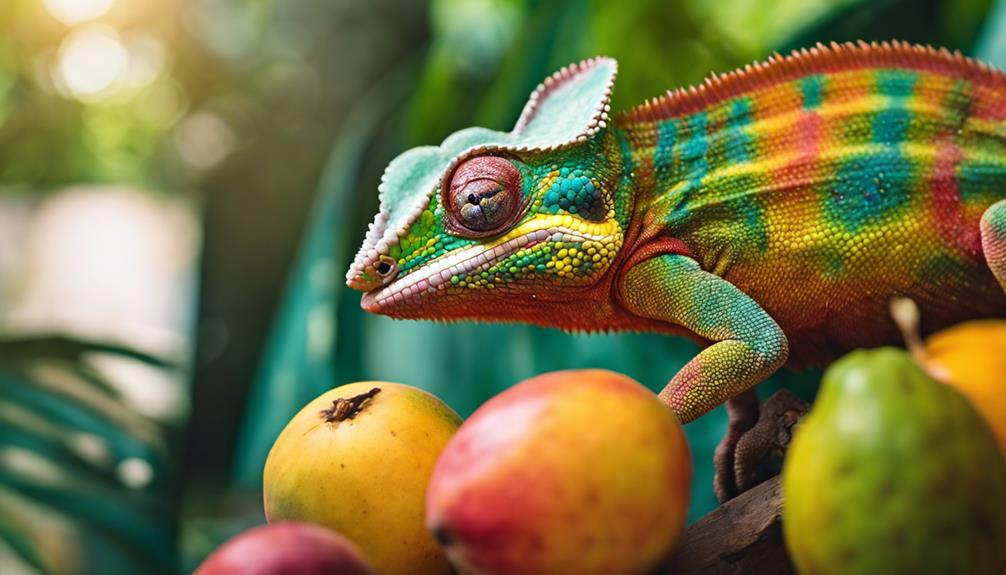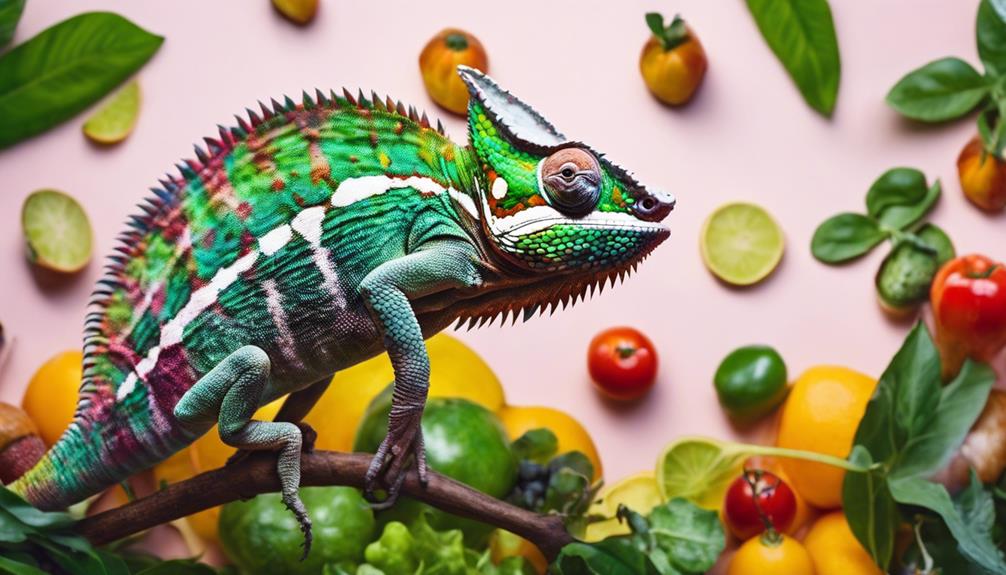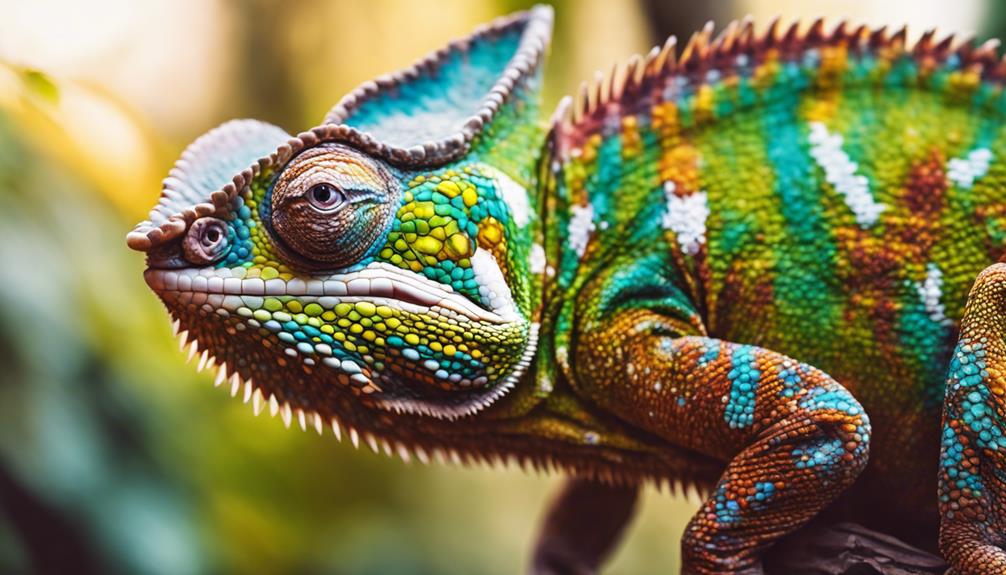When it comes to nourishing your Cuban False Chameleons, understanding their dietary preferences is essential for their overall well-being. Ensuring they receive the right balance of nutrients from their fruit choices can greatly impact their health.
By exploring the intricacies of their diet and incorporating appropriate feeding practices, you will be equipped to support their vitality. Discover how to optimize their eating habits and promote a healthy lifestyle that benefits these fascinating creatures.
Recommended Fruits for Cuban False Chameleons
When feeding Cuban false chameleons, provide a diverse selection of fruits such as papaya, mango, and blueberries to guarantee a balanced nutritional intake. These fruits offer essential vitamins, minerals, and antioxidants important for the chameleons’ health. To make easy consumption, cut the fruits into small, bite-sized pieces that are manageable for the lizards to eat. While offering a variety of fruits is important, it’s equally important to avoid citrus fruits like oranges or lemons as they can lead to digestive issues in false chameleons.
In their natural habitat, Cuban false chameleons also consume small insects to supplement their diet. Therefore, incorporating a mix of fruits and occasional insect feedings can provide a well-rounded nutritional profile for these reptiles. Watch for signs of dehydration in your chameleons, such as sunken eyes, lethargy, or wrinkled skin. If these signs are observed, consider offering water-rich fruits like cucumbers or melons to help rehydrate the lizards.
Opting for organic fruits is recommended to minimize pesticide exposure and promote the overall health of Cuban false chameleons. Additionally, closely monitor how the chameleons respond to different fruits, adjusting their diet according to their preferences and nutritional requirements. By offering a diverse array of fruits and paying attention to their needs, you can make sure that your Cuban false chameleons receive a well-balanced and nutritious diet.
Balancing Nutrients in Their Diet
To maintain top health in your Cuban false chameleons, it’s important to carefully balance the nutrients in their diet by providing a diverse selection of fruits rich in essential vitamins and minerals. Ensuring a well-rounded diet for your chameleons can help prevent deficiencies and health issues such as metabolic bone disease.
Here are some key points to contemplate:
- Incorporate fruits rich in vitamin D: Vitamin D plays a critical role in calcium absorption, which is essential for maintaining strong bones and preventing metabolic bone disease. Fruits like papaya and mango are excellent sources of vitamin D, helping to support your chameleon’s skeletal health.
- Provide a variety of fruits: Offering a range of fruits such as kiwi, which is rich in vitamin C, can help boost your chameleon’s immune system and overall health. Calcium-rich fruits like figs can also contribute to bone strength, aiding in the prevention of metabolic bone disease.
- Ensure access to a water bowl: While fruits are a great source of hydration, always make sure your chameleons have access to a clean water bowl in their habitat. Proper hydration is critical for overall health and can aid in digestion and nutrient absorption from the fruits they consume.
Avoid Harmful Fruits and Foods
You should avoid feeding Cuban false chameleon fruits high in citric acid, avocados, grapes, raisins, onions, garlic, chocolate, caffeine, and alcohol as they can be harmful or toxic to their health. Fruits high in citric acid like oranges and lemons can disturb their digestive system, while avocados contain persin, a substance toxic to many animals, including reptiles. Grapes and raisins should also be avoided since they’ve been known to cause kidney failure in some reptiles, including false chameleons. Onions and garlic can lead to gastrointestinal issues and even anemia in these chameleons. Keep chocolate, caffeine, and alcohol away from Cuban false chameleons as these substances are toxic and potentially fatal.
To maintain the well-being of your Cuban false chameleon, it’s important to provide a diet primarily consisting of live insects. Supplement their diet with a specialized snail occasionally for added nutrients. Additionally, make sure to offer fresh water daily to keep them hydrated. These chameleons also need to be misted regularly to maintain proper humidity levels in their environment. By avoiding harmful fruits and foods and providing a diet rich in live insects, fresh water, and a properly misted habitat, you can help your Cuban false chameleon thrive in a healthy environment.
Feeding Schedule and Portions
For the best nutrition and health maintenance of Cuban false chameleons, it’s essential to establish a balanced feeding schedule and regulate fruit portions carefully. When it comes to feeding your Cuban false chameleon, keeping a consistent routine is key. Here are some important considerations for their feeding schedule and portions:
- Moderation is Key: Limit fruit feeding to once or twice a week to prevent nutritional imbalances. While fruit can be a healthy treat, overdoing it can lead to issues like obesity or digestive problems.
- Rotate for Variety: Rotate between different fruits to provide a variety of nutrients. This guarantees that your chameleon is getting a broad spectrum of vitamins and minerals necessary for their well-being.
- Hydration Matters: Cuban false chameleons prefer to drink water droplets from leaves or a drip system rather than from a water bowl. Hence, it’s important to keep them hydrated by misting their enclosure regularly or using a drip system to simulate rain.
Monitoring Health and Dietary Changes
Regularly monitoring the health and dietary changes of your Cuban false chameleons is important for ensuring their well-being and detecting any potential issues early on. Start by keeping an eye on their weight changes, as sudden fluctuations could indicate health issues or dietary deficiencies. Additionally, observe their activity levels; a decrease in activity may suggest underlying problems. Changes in appetite should also be noted, as a sudden decrease or increase could signal health concerns.
It is vital to track their fruit consumption patterns to make sure that it complements their primary diet of snails and insects. Adjust fruit offerings based on their response and overall well-being to maintain a balanced and nutritious diet. If you notice any unusual behaviors or symptoms related to their diet, consult a veterinarian experienced with reptiles promptly. By monitoring weight changes, activity levels, appetite, and fruit consumption closely, you can proactively address any issues that may arise and promote the health and longevity of your Cuban false chameleons.
Frequently Asked Questions
What Can Cuban False Chameleons Eat?
You can feed Cuban false chameleons a variety of fruits like papaya, mango, and banana. Offer fruits as occasional treats to maintain a balanced diet. Guarantee proper fruit selection, feeding schedule, nutritional balance, and digestive health for their well-being.
Why Is My Cuban False Chameleon Not Eating?
Your Cuban False Chameleon might not be eating due to common reasons like stress or illness. Health issues, environmental factors, or behavioral changes can affect appetite. Monitor closely and adjust care accordingly for their well-being.
What Do False Chameleons Need?
False chameleons need a habitat with proper temperature, humidity, and hiding spots. Their feeding schedule should consist of snails and insects. Nutritional supplements may be necessary. Behavioral cues like basking and hunting should be monitored.
Are Cuban False Chameleons Omnivores?
Cuban false chameleons are primarily molluscivores, not omnivores. Their feeding habits revolve around snails. Fruits are not part of their dietary preferences. To meet their nutritional requirements, focus on their specialized diet rather than omnivorous behavior.
Conclusion
In summary, ensuring a well-rounded diet for your Cuban False Chameleons is vital for their overall health and happiness. By carefully selecting and providing a variety of fruits, monitoring their nutrient intake, and avoiding harmful foods, you can help them thrive in captivity.
Remember, the key to a healthy diet is a balanced one. So, keep up the good work and continue to prioritize their well-being for a long and fulfilling life together.


